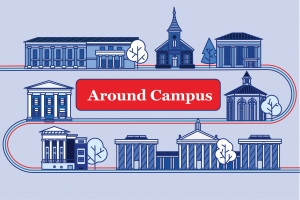
Washington and Lee University Installs New Electric Vehicle Charging Station on Campus The EV station, located on the top deck of the University Parking Garage, will be accessible to the university community and campus visitors.
Washington and Lee University has installed a new Level 2 electric vehicle (EV) charging station in the University Parking Garage that will be available for use starting the afternoon of Monday, Oct. 16. The charging station is provided by JuiceBar, a Roanoke-based company that guarantees all products are made in the United States.
The EV station, which can service two vehicles at the same time, is located on the top level of the garage between two dedicated parking spaces in the corner closest to the Lenfest Center for the Performing Arts.
The electrical output of the device is powered by the garage’s solar canopy during daylight hours, and the university encourages thoughtful use of the charging outlets that are available to W&L registered vehicles and campus visitors alike. W&L recommends that registered community members limit their sessions to four hours, but they may charge for longer with increased charging rates. Campus visitors without a W&L parking permit are limited to a maximum of six hours. Vehicles parked in the EV spaces but not actively charging will be towed at the owner’s expense.
“Access to charging can be a real barrier to making the switch to an EV,” said Jane Stewart, W&L’s director of sustainability. “With the addition of a charging station on campus, we hope to make that barrier less daunting. This is especially true for those living on campus without access to ‘at-home’ charging, and for faculty and staff who may need a workday charge to facilitate their commute.”
There are limited EV charging opportunities in the greater Lexington area, including eight Tesla charging stations at Sheetz, seven Tesla stations at the Holiday Inn Express, and five additional EV chargers of various types throughout Rockbridge County. Level 2 charging typically adds 12-32 miles of range per hour of charging, depending on the vehicle’s make and type of battery.
Fees for using the charging station help offset infrastructure and electricity costs and encourage users to be mindful of their energy consumption. W&L parking permit holders will be charged $1.50 per hour for the first four hours; $3 per hour for an additional four hours; and $6 per hour after eight hours of use. Campus visitors may charge at a flat rate of $3 per hour for the six-hour maximum.
All payments for W&L’s JuiceBar charging station will be handled through the company’s ActivateEV app, which is available for download through various mobile app stores.
“The largest portion of greenhouse emissions in the United States comes from transportation, and transitioning away from gas-powered vehicles to more efficient electric vehicles is an important part of addressing those emissions,” said Stewart. “This new station is another step toward supporting sustainable choices by making them accessible and convenient for our campus community.”
Anticipated as a pilot program, the first station will allow W&L to gauge demand for charging on campus and will inform decisions about the need for future additions. As the university accelerates EV transition in the campus vehicle fleet, additional charging stations are planned for powering university-owned vehicles.
The installation of an EV charging station is another example of the university’s sustainability strategy in action. W&L is pursuing a goal of shifting to a carbon-neutral campus by the year 2050, and the university continues to make significant progress toward that objective through the work of the Office of Sustainability and Energy Education. In addition to the new charging option, W&L’s off-site solar array agreement is expected to generate a 100 percent match for the university’s annual electricity consumption and, last year, the school eliminated sales of bottled water on campus.

You must be logged in to post a comment.